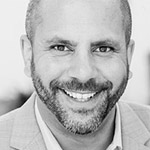Welcome to Mindfulness in Medicine, a monthly column by best-selling author Anne Bruce designed to cultivate leadership and collaborative relationships among hospital leaders, nurses, providers and ancillary staff. Mindfulness is a powerful leadership tool that enhances emotional intelligence in medicine. It is a tool that, when practiced, can help us develop and implement relational coaching skills and illuminate various ways to improve hospital operations and cross-departmental performance. Mindfulness also improves our capacity for decision-making and participatory medicine, all while enhancing our own health and well-being. Your comments and insights on these postings are greatly valued.
Anne Bruce has provided training and performance coaching for Vituity. She is also a bestselling author of more than 20 books.
In this month's column, Anne welcomes Dawa Tarchin Phillips, the renowned expert on mindfulness and leadership, and his timely contribution to Perspectives on Acute Care Continuum: "How Mindfulness Can Improve Doctor-Patient Relationships, Part 1."
The multifaceted relationship between doctor and patient traditionally meets its mark when it is one of mutual respect, professionalism and trust. Even Consumer Reports, the independent consumer agency, continually has reported that openness, respect and trust are critical to a successful doctor-patient relationship.
In order for the healthcare collaboration to be an effective and satisfying experience — whether it's the full restoration of the patient's health; the ongoing, effective treatment of the patient's condition; or simply a patient's prescribed treatment compliance — both doctor and patient need to be equally committed and engaged to give the crises at hand their very best.
But what if a doctor's very best becomes less and less available? What if stress levels, mood variances, burnout and increased distraction on both sides are undermining the quality of "the very best" to a point where it's anything but?
How can openness, respect and trust between doctor and patient be kept from atrophying? Or how can it be rebuilt once lack of attention and the lack of quality in human presence have eroded its underpinnings?
Mindfulness May Hold Keys
Mindfulness, an evidence-based practice for cultivating focus, attention and presence, could hold keys to significantly improving the doctor-patient relationship.
Mindfulness is classified in most scientific literature as focused attention free from distraction and open, nonjudgmental attention to direct, present-moment experience. Mindfulness is the foundation of focus and our ability to be present no matter what.
Several studies recently have illustrated the effects and benefits that physician mindfulness can have on doctor-patient relationships.
A pilot study at the University of Wisconsin-Madison School of Medicine and Public Health recently examined the effects of a condensed introductory course in mindfulness on 30 primary care clinicians. Results showed that even after a rudimentary course, not only did the physicians show decreased levels of burnout, anxiety, depression and distress, but effects persisted and were measurable almost a year later without any additional mindfulness training sessions.
In another collaborative study between Johns Hopkins University, Oregon Health Science University, University of Rochester, St. Luke's Roosevelt Medical Center, University of California San Francisco, Wayne State University and Portland VA Medical Center, researchers found patients were more profoundly satisfied and more open when relating with the more mindful clinicians (when compared to their less mindful physician peers).
The more mindful clinicians showed greater positivity during interactions with patients, exhibited greater focus during conversations and showed more consistent attempts at strengthening the doctor-patient relationships and asking about the patient’s feelings. Not only did they accomplish just as much clinically as their least mindful peers, but they did so while still relating with patients about nuanced personal experiences and important relationships.
In the study's extreme cases, less mindful clinicians failed to pay attention to their patients altogether and frequently missed important opportunities to be empathic.
As ongoing research into the job pressures of trained physicians reveals that two-thirds of trained doctors suffer from emotional, mental and physical exhaustion even resulting in burnout, the question arises how these conditions affect the doctor-patient relationship and what mindfulness training might offer to mediate those trends? Both doctors and patients stand to benefit.
Cultivate Discernment
Here is how you can start to explore what mindfulness is and how it can affect your everyday interactions:
- Investigate and acknowledge that what you control in your life boils down to what you think, imagine, say, do and how you choose to respond to life's daily events and challenges.
- Investigate and acknowledge that all of the above takes place during the present moment experience, each day, every day.
- Investigate and acknowledge that if you are not present in this moment, you subsequently have little or no control in your life right now.
- Resolve that well-intended attempts to gain greater control by not being fully present are not only irrational but generally prove to be counterproductive.
Once you have identified the simple truth of this reflection, you can take next steps and develop a few simple disciplines that make being present easier and being mindful feel natural.
So how can you cultivate greater mindfulness in your practice of medicine? Tune in Feb. 4 for Part 2 of this insightful article from our Mindfulness in Medicine series.
About the Authors
Anne Bruce has provided training and performance coaching for Vituity. She also serves as MBSI's Employee Development Coach and Leadership Facilitator. Anne is a bestselling author with more than 20 books published by McGraw-Hill Publishing, New York. She considers her award-winning life-coaching book, Discover True North: A 4-Week Approach to Ignite Passion and Activate Potential (McGraw-Hill Publishing) to be one of her most "mindful" books to date. She also leads a popular Discover True North Expedition group on LinkedIn. Anne can be reached at 214-507-8242 or by writing to her at Anne@AnneBruce.com.
Dawa Tarchin Phillips is President/CEO of Empowerment Holdings, a leadership development and consulting firm that trains hundreds of professionals every year in mindfulness-based leadership and professional skills and interventions. Dawa is also a research specialist at the Department of Psychological and Brain Sciences at UC Santa Barbara and the founder and executive director of The Institute of Compassionate Awareness (TICA). You can read more about Dawa's work at www.empowermentholdings.com, and you can email him at dtp@empowermentholdings.com or phone 805-680-3988.























